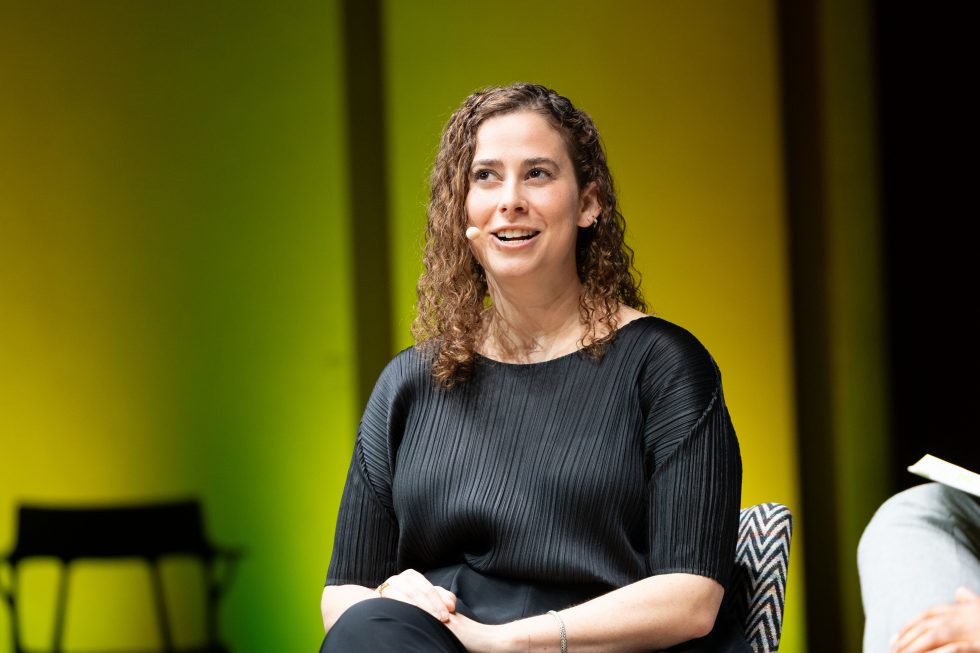
Leah Feiger is not just the senior politics editor at Wired US: she is the very first. The politics section was launched under her guide.
“I cannot state enough how farsighted Katie Drummond was. As global editorial director of Wired, she saw that tight connection between tech and politics coming,” Feiger said.
“Before that, I’d worked for The Atlantic, The New York Times and The Washington Post, and then she asked me to lead the new upcoming team.”
That is what Feiger told me, whilst sitting on a chair she grabbed from one side of the room, to start the conversation in a distant and silent corner.
It happened, in fact, in the middle of the packed calendar of events at the first Italian edition of The Big Interview – Wired’s platform for exploring how technology is transforming every aspect of life, from culture to business, science to design.
According to Drummond, The Big Interview is set to evolve into a YouTube series, a live event, perhaps “even a good old-fashioned print issue.”
The project is expanding globally, and on 26 June it brought together experts from across disciplines at Bocconi University in Milan, to explore how and why technology shapes every aspect of our lives.

Leah Feiger, senior politics editor at Wired US, during her talk at The Big Interview event by Wired Italy, held at Bocconi University in Milan on 26 June 2025. Photo: Franco Russo.
DOGE alliance
When I met Feiger, she had just concluded her talk, DOGE: Chronicles of a Digital Coup d’État – DOGE: cronache di un colpo di stato digitale – focused on the partnership between Elon Musk and US President, Donald Trump, a story that came to define not only the White House narrative, but that of the Department of Government Efficiency in particular.
After her time as managing editor at VICE News, Feiger helped lead Wired’s coverage of what the newsroom has called “Musk’s attack on the United States government.”
There’s no denying that in recent months, the tech magnate and US politics have grown closer than ever – until the fallout that followed Musk’s departure from DOGE.

Elon Musk, owner of X, during a conference at the Conservative Political Action Conference in Maryland, United States. Photo: Wikimedia Commons.
“We should be blunt about it, how the most powerful and the richest men came to ally. Of course, they were too narcissistic to last without clashing.”
Still, while I can understand how Trump took advantage of X’s owner, who backed his presidential campaign, it’s harder to pin down exactly what the latter got in return.
“Well, he got his way into government data: population, contracts, names, everything. He has numerous allies in position of power, both in government – particularly the right wing of course – and in Silicon Valley,” she said.
“But we haven’t seen the end of the DOGE yet.”
The what ifs are a lot indeed, as in this case government decision-making was shaped by a particularly sharp business instinct on both sides.

A plaque at the Columbia School of Journalism. Photo: Wikimedia Commons.
Journalism is here to stay
So if the traditional democratic principles of Montesquieu’s legacy – namely, a system of checks and balances – are no longer respected, even as a façade, it seems that journalism is more essential than ever.
I wanted to ask Feiger, a graduate of Columbia University – one of the world’s most prestigious journalism schools – for her view on the classic leitmotif of journalism as a watchdog, a role we learned, after all, from the American example.
She is confident: American journalism remain voracious, and committed to holding power to account.
And even if newsrooms are increasingly filled with influencers – since, according to Feiger, there is no such thing as a journalist–influencer – good reporters still exist. And the few who remain make their skills and ethical commitment all the more valuable.
“Real journalism ought to be cherished and championed. Especially right now, when both governments and companies prefer giving interviews to influencers. It allows them to hide from the public.”
The latest Reuters Digital News Report finds that although national broadcasters remain in good health, very few people tend to trust journalists.
By contrast, many regards new media figures as journalists – and treat them as trusted voices.
Meanwhile, polarisation continues to divide the American public, and most people tend to avoid diversifying their sources — let alone engaging in fact-checking.
“It’s true, we are a divided nation,” Feiger said.
“But it also means many people no longer believe everything they see online. Then again, many more place their trust in so-called citizen journalism, or in influencers, once again.”
Watch the boogeyman
So who’s responsible for providing reliable, high-quality counter-information, I wonder.
Well, the Democrats are now arming themselves with a media war room, precisely for that purpose. Feiger confirms that while mainstream media in the US has struggled to counter fake news in recent years, the Democrats have done even worse.
It is the winning “flood the zone” strategy, suggested by Steve Bannon, that has evolved to match the latest waves in the social media ecosystem.

Photo: Unsplash.
“The public wanted a free flow of information. Trump gave it to them. They didn’t want 30 charming seconds from Kamala Harris, but three hours of a conversation filling the time and space of attention. That means flooding the zone, also with Musk’s economic and technological support. They killed it, the Republicans.”
And populist communication is ideally suited to feed an algorithm driven by conflict and confrontation. While the Democrats still went door to door or relied on phone calls, the Republicans were, indeed, killing it.
They were creating, Feiger said, “boogeymen,” challenges and fears not based on evidence, but shaped through compelling portrayals of undetectable enemies.
But if what people believed to be the news — and sometimes, it truly was — appeared above that horrific and hateful tagline, then it must have been true.
Statistics or polls win neither the election, nor the battle for attention.
“Monsters under the bed do.” And whether or not some journalists understood that, they simply couldn’t match that kind of firepower.
Make friends
This, again, goes back to how deeply technology has embedded itself in every aspect of daily life.
Feiger says that’s precisely why Wired launched its politics section: if everything is political, we can no longer deny that almost everything is also technological, especially when we produce data even through the most manual tasks.
“Wired and the whole team is so singularly good precisely because we look for the connections.”
And that is exactly what people should be taught to do.
The Reuters Digital News Report points out that the US is among the most committed countries when it comes to investing in media literacy – and yet younger audiences still avoid traditional news outlets.
Something often goes overlooked – even by journalists.
“To younger colleagues, I would recommend becoming an expert. Find your area of interest and become the best at it. You can always hop from subject to subject, or at least find the connections.”
Feiger also encourages emerging reporters to reach out to people they assume will never reply.
“One more tip: make friends with other journalists.”









